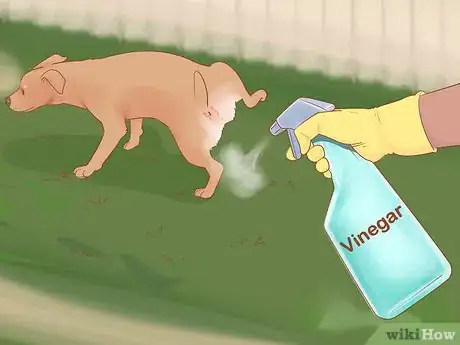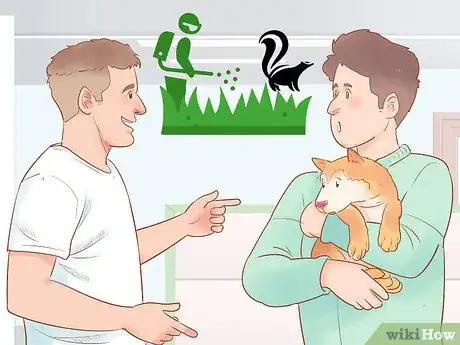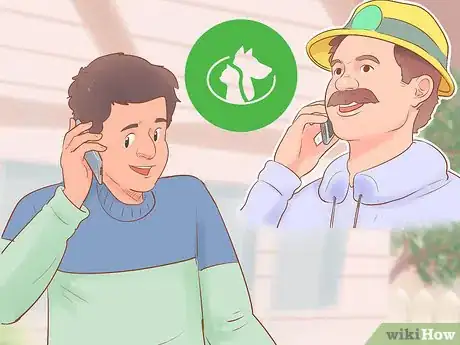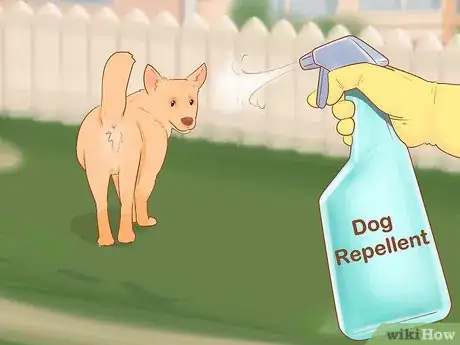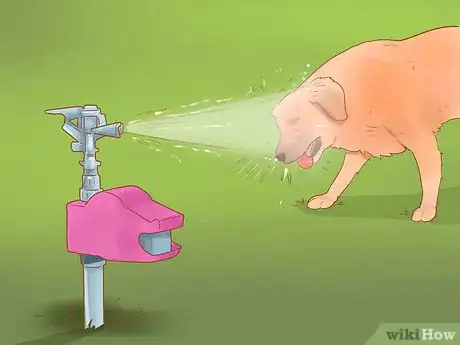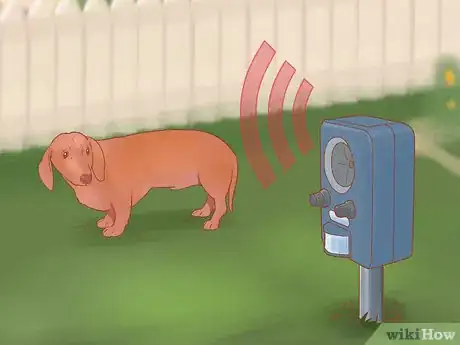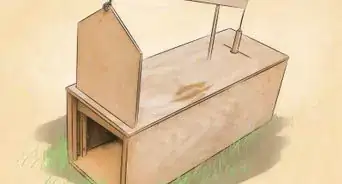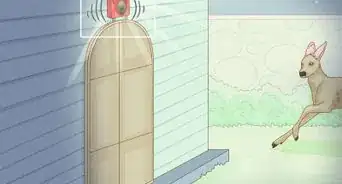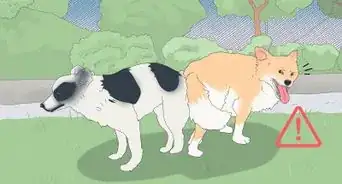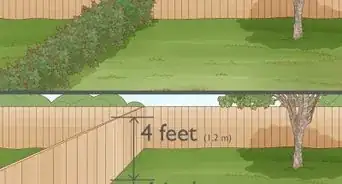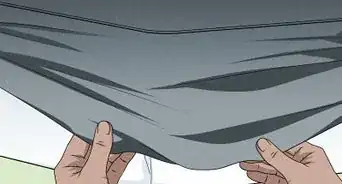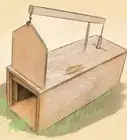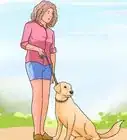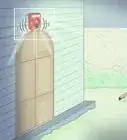This article was co-authored by Alexis Toriello. Alexis Toriello is a Certified Dog Behavior Consultant and the Founder and CEO of Zen Dog Training in New York. Her time working as a canine behavior specialist in various animal shelters has made her knowledgeable in assessing, rehabilitating, and training dogs. In addition to being an Associate Certified Dog Behavior Consultant (ACDBC), Alexis is a Certified Professional Dog Trainer - Knowledge Assessed (CPDT-KA) and a Master’s Degree Candidate in Animal Behavior and Conservation at Hunter College. She is certified by the American Red Cross in Canine First-Aid and CPR and has endorsements from numerous hospitals and clinics and the Washington Humane Society.
There are 9 references cited in this article, which can be found at the bottom of the page.
This article has been viewed 887,828 times.
Few things are quite as frustrating as catching a stray dog doing his business on the lawn you just painstakingly. If you have pets of your own, having a dog mark your lawn may negatively affect their behavior. Moreover, dogs are drawn to the smell of one another, meaning that invasive pouches can be a snowballing problem. However, there are a plethora of natural, artificial, and even social solutions that will help you nip the problem in the bud.
Steps
Trying Home Remedies
-
1Spread baking soda around the perimeter. Prepare a mixture of water and baking soda, approximately one cup of baking soda per gallon of water. Apply around the perimeter and where the dog has urinated. Repeat at least twice per week.
- Baking soda will also protect plants from the damage caused by dog urine.
- Baking soda will neutralize the smell of dog urine, which should both make your nose happy and halt the territorial behavior that draws dogs to one another’s urine.[1]
-
2Spray vinegar around the perimeter. Spraying undiluted vinegar around the perimeter of the lawn creates a sort of invisible fence that drives off both dogs and cats. A roaming dog will take one sniff of your lawn and turn away, but you should keep reapplying the vinegar on a daily basis. Also try to apply vinegar where the dog has urinated.
- Vinegar can also work as a natural herbicide to kill various weeds. For this reason, though, you should avoid spraying it over your entire lawn, since it has the potential to damage vegetation.
- Vinegar neutralizes the smell of dog urine, which should both make your nose happy and halt the territorial behavior that draws dogs to one another’s urine.
Advertisement -
3Change fertilizer. Many dogs have a strong reaction to the smell of organic material. Try a new fertilizer if dogs seem to be drawn to yours. Dogs are especially drawn to blood, fish, and bone meal. Try a plant-based fertilizer.[2]
-
4
-
5
Working with the Neighbors
-
1Be neighborly. The first step to keeping dogs of your lawn is to convince the dogs’ owners to cooperate. Make friends with your neighbors. Express concern about your lawn without accusing them or their dog of being at fault. Ideally they will begin to police their dog better if they know it might be a problem.[7]
-
2Suggest that your lawn is unsafe. If friendly cooperation is unlikely and you don’t mind being a bit dishonest, tell your neighbors that you have had your lawn chemically treated to repel raccoons or skunks and that it could be dangerous for dogs.[8]
- There are a number of reasons why this is generally a less than optimal solution. It could illicit a negative reaction and lying will compromise your ability to appeal to authorities later in the process.
-
3Confront your neighbor. If you know whose dog is responsible, consider contacting the owner. Be casual; invite him over for dinner or a drink. Instead of accusing him, assume that he is unaware of the situation and just needs to be informed of it.[9] If the owner agrees to do something about it, drop the subject. Continuing to complain will likely aggravate him and jeopardize any agreement you might have reached.
- If you cannot reach an agreement, send a formal written complaint. Keep a copy for yourself so that you can prove to the authorities that you made an effort to resolve the issue.
-
4Report the neighbors. Look up local ordinances to see if they require dog owners to clean up after their pets; in most cases they will.[10] Take a picture of the dog urinating or defecating on your lawn and call Animal Control to report the infraction.
- In most cases city ordinances will be posted on the city’s website. Look up your city’s website to see what the law says about the situation.
- Alternatively, you can install a security camera to prove that the dog is invading your lawn. This can also be useful if your neighbor becomes aggressive and you want to prove his poor behavior to the authorities.
Taking Bigger Steps
-
1Spray a commercial dog repellent. These products usually come as sprays or powders, and you can often find them at pet shops and garden supply stores. There are numerous scents manufacturers use to drive dogs away, and most products contain natural ingredients.
- Some of these dog repellants are meant to have a bitter smell that dogs dislike. Others actually smell like the urine of the predators and will thus scare dogs away.[11]
-
2Install a motion-activated sprinkler. Motion-activated sprinklers are not only designed to water your lawn but also to scare off any visiting critters, including dogs, cats, and raccoons. Set these sprinklers up along the perimeter of your lawn or at any specific spot where visiting strays frequently do their business. As the dog passes in front of the sprinkler, the motion will set it the sensors, triggering a quick spray of water. This spray is enough to startle most dogs and send them scurrying away.[12]
-
3Put up a fence. Nothing keeps animals out quite like a physical barrier. Dogs looking for an easy spot to take care of their business will likely skip over lawns with fences in favor of those without. Make sure you keep the gate of your fence closed and periodically monitor the perimeter for holes dug by stubborn canines.[13]
- If you already have a fence, check for holes that need to be repaired. It is also possible to purchase electrified fences, but that is an extreme solution.
-
4Use an ultrasonic repellent. Ultrasonic repellents are also motion-activated. You can mount the mechanism onto a shed, tree, or fence. As the dog approaches, it will trigger the sensors, causing the repellent to emit sonic and ultrasonic sound waves that are intended to bother the dog.
- It is unclear how well these devices actually work. Until more evidence emerges supporting their efficacy, this should probably be your last resort.[14]
Expert Q&A
-
QuestionWhat can I do if my neighbor's dog keeps coming in my yard?
 Alexis TorielloAlexis Toriello is a Certified Dog Behavior Consultant and the Founder and CEO of Zen Dog Training in New York. Her time working as a canine behavior specialist in various animal shelters has made her knowledgeable in assessing, rehabilitating, and training dogs. In addition to being an Associate Certified Dog Behavior Consultant (ACDBC), Alexis is a Certified Professional Dog Trainer - Knowledge Assessed (CPDT-KA) and a Master’s Degree Candidate in Animal Behavior and Conservation at Hunter College. She is certified by the American Red Cross in Canine First-Aid and CPR and has endorsements from numerous hospitals and clinics and the Washington Humane Society.
Alexis TorielloAlexis Toriello is a Certified Dog Behavior Consultant and the Founder and CEO of Zen Dog Training in New York. Her time working as a canine behavior specialist in various animal shelters has made her knowledgeable in assessing, rehabilitating, and training dogs. In addition to being an Associate Certified Dog Behavior Consultant (ACDBC), Alexis is a Certified Professional Dog Trainer - Knowledge Assessed (CPDT-KA) and a Master’s Degree Candidate in Animal Behavior and Conservation at Hunter College. She is certified by the American Red Cross in Canine First-Aid and CPR and has endorsements from numerous hospitals and clinics and the Washington Humane Society.
Certified Dog Behavior Consultant Talk to your neighbor about the issue and ask them about containing their dog on their property.
Talk to your neighbor about the issue and ask them about containing their dog on their property. -
QuestionHow do I keep my dog in the yard?
 Pippa Elliott, MRCVSDr. Elliott, BVMS, MRCVS is a veterinarian with over 30 years of experience in veterinary surgery and companion animal practice. She graduated from the University of Glasgow in 1987 with a degree in veterinary medicine and surgery. She has worked at the same animal clinic in her hometown for over 20 years.
Pippa Elliott, MRCVSDr. Elliott, BVMS, MRCVS is a veterinarian with over 30 years of experience in veterinary surgery and companion animal practice. She graduated from the University of Glasgow in 1987 with a degree in veterinary medicine and surgery. She has worked at the same animal clinic in her hometown for over 20 years.
Veterinarian Some dogs are born escape artists and, despite your best efforts, they will find a way to escape. Provide adequate fencing that is high enough to prevent the dog jumping over the top, and anchored at the bottom so the dog can't dig under. Check the fencing regularly for gaps and repair them immediately.
Some dogs are born escape artists and, despite your best efforts, they will find a way to escape. Provide adequate fencing that is high enough to prevent the dog jumping over the top, and anchored at the bottom so the dog can't dig under. Check the fencing regularly for gaps and repair them immediately. -
QuestionHow can I keep my neighbor's dog out of my yard?
 Pippa Elliott, MRCVSDr. Elliott, BVMS, MRCVS is a veterinarian with over 30 years of experience in veterinary surgery and companion animal practice. She graduated from the University of Glasgow in 1987 with a degree in veterinary medicine and surgery. She has worked at the same animal clinic in her hometown for over 20 years.
Pippa Elliott, MRCVSDr. Elliott, BVMS, MRCVS is a veterinarian with over 30 years of experience in veterinary surgery and companion animal practice. She graduated from the University of Glasgow in 1987 with a degree in veterinary medicine and surgery. She has worked at the same animal clinic in her hometown for over 20 years.
Veterinarian The same tactics for keeping a dog in, are effective against keeping dogs out (i.e. fencing). But have a polite chat with the neighbor and explain you don't want the dog in the yard. This should always be your first option, as the dog is the owner's responsibility and you shouldn't need to go to the expense of fencing in order to deprive the dog of access.
The same tactics for keeping a dog in, are effective against keeping dogs out (i.e. fencing). But have a polite chat with the neighbor and explain you don't want the dog in the yard. This should always be your first option, as the dog is the owner's responsibility and you shouldn't need to go to the expense of fencing in order to deprive the dog of access.
References
- ↑ https://www.vetinfo.com/how-keep-dogs-off-your-lawn.html
- ↑ http://northcoastgardening.com/2014/10/dogs-eating-organic-fertilizer/
- ↑ http://pets.thenest.com/natural-deterrent-keep-dogs-away-10037.html
- ↑ http://www.houselogic.com/home-advice/gardens/how-to-keep-dogs-out-of-garden/
- ↑ http://www.lifewithdogs.tv/2013/02/dog-owners-irate-after-finding-cayenne-pepper-dumped-on-neighbourhood-lawns/
- ↑ https://www.vetinfo.com/how-keep-dogs-off-your-lawn.html
- ↑ http://community.havahart.com/dogs/grass-dog-repellents/
- ↑ http://community.havahart.com/dogs/grass-dog-repellents/
- ↑ Alexis Toriello. Certified Dog Behavior Consultant. Expert Interview. 23 February 2021
- ↑ http://community.havahart.com/dogs/grass-dog-repellents/
- ↑ https://www.vetinfo.com/how-keep-dogs-off-your-lawn.html
- ↑ https://www.vetinfo.com/how-keep-dogs-off-your-lawn.html
- ↑ Alexis Toriello. Certified Dog Behavior Consultant. Expert Interview. 23 February 2021
- ↑ http://www.dogster.com/lifestyle/ultrasound-dog-deterrents-and-repellers-training
About This Article
To keep dogs off your lawn, try spraying a mixture of water and baking soda on your lawn, which will neutralize the smell of dog urine so that dogs are less likely to come back. You can also spray your lawn with vinegar to keep dogs away, but use it sparingly since it might damage your plants. Also, try planting some lavender or prickly shrubbery around the perimeter of your lawn to act as a natural dog repellent. For more tips from our Veterinary co-author, like how to work with your neighbor to keep their dog off your lawn, scroll down!

